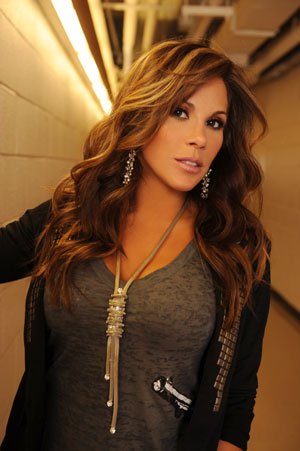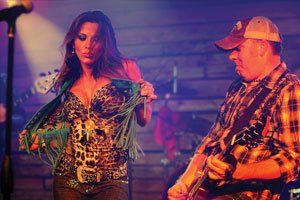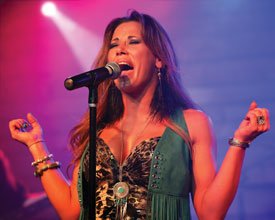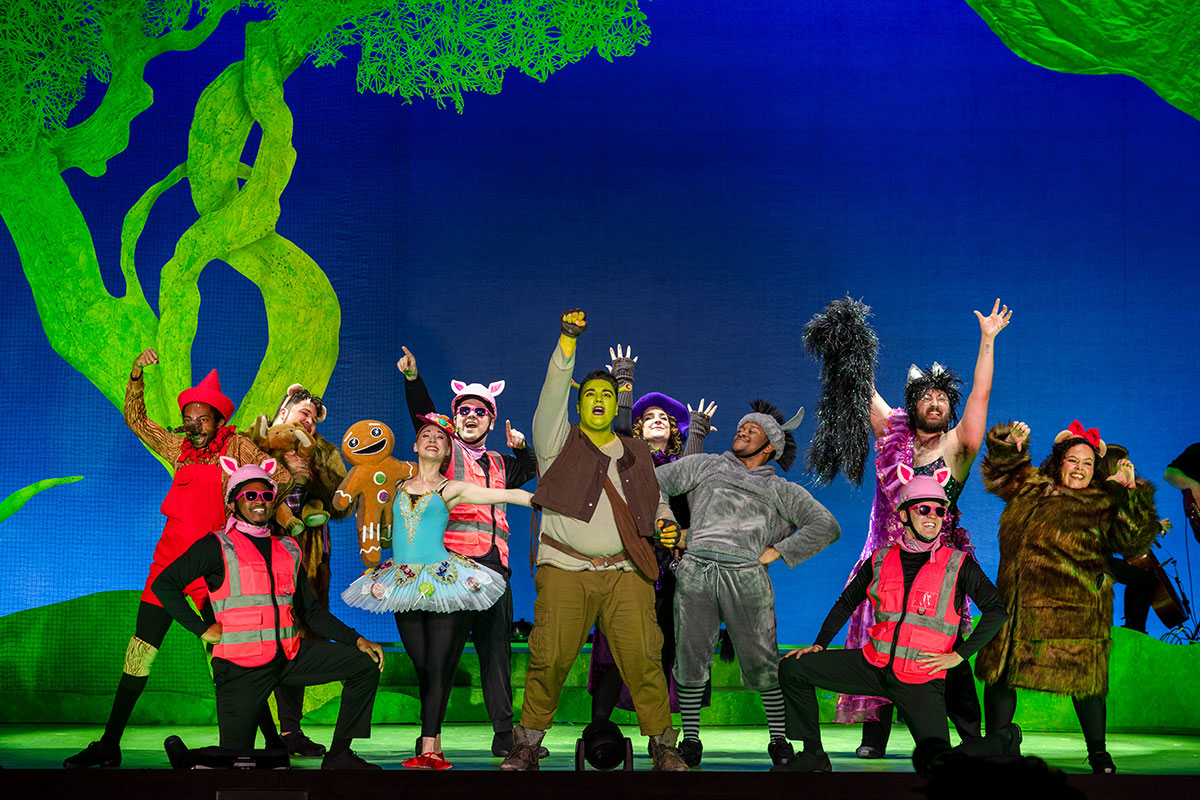By Gerry Strauss
From rumbling to recording, how Virginia’s Mickie James went from wrestling superstar to country music sensation.

As the old saying goes, Virginia is for lovers. So how did one of pro wrestling’s hardest-hitting butt-kickers—a 5’ 2” woman, no less—emerge from the “Mountain State”?
Even crazier, how did this tough cookie, whose resume includes dangerous cage matches, brawls in front of 80,000 fans on worldwide pay-per-view, and appearances alongside “Nature Boy” Ric Flair and Hulk Hogan, find her way to a music career as an up-and-coming, soulful, hard-rocking country sensation?
Let’s start with the easy questions: Where in the world did this girl come from?
She grew up in a small town outside of Richmond called Montclair. The petite-yet-buff beauty who just happens to be a former eight-time Women’s Champion and a current female superstar of Spike TV’s hugely popular “Impact Wrestling” says of her hometown: “It’s really adorable, but don’t blink because you’ll miss it.”
James’ small-town childhood was a happy one, but it was clear to all who knew her that she was destined for something more. Outgoing, engaging and musically inclined, she was a born performer. A competitive drive emerged very early in her life, but not in the way you’d expect.
“My grandmother had a horse farm, and as I grew up, most of my summers and my weekends were spent there,” she recalls. “I showed and competed in horse shows and trained horses pretty much all my life. That’s what I envisioned myself becoming ever since I was a little girl.”
As fulfilling as James’ work with horses was (she is still very much the equestrian today), a very different line of work had gradually begun to call her name: professional wrestling. James fell in love with the sport while watching the World Wrestling Federation on television with her dad at an early age. The WWF, (now WWE) had taken hold as the nation’s most popular pro wrestling product, appealing to mainstream television viewers with an outlandish mix of over-the-top characters, amazing athleticism, and the involvement of celebrities and popular music stars. This larger-than-life world was right up James’ alley, and from then on, she was hooked.

After graduating high school, a friend clued James into the existence of a school in Washington, D.C. for aspiring wrestlers. She had no idea that such a thing even existed, but she excitedly took the two-hour trip from home to check it out, fell in love with the idea, and agreed to embark on a career path that would eventually lead her to worldwide stardom.
To those unfamiliar with pro wrestling, it hurts, a lot. Aspiring pro’s learn that pro wrestling is a predetermined show, but one that requires a great deal of skill, training and toughness to willingly put their bodies through the abuse that is required to get through even one match, let alone a career. Going through a standard wrestling school’s training regimen is enough to scare away many an athlete. Regardless, James was focused, committed and up for the challenge.
“That wrestling school gave me my start and opened the door for me in the business,” James declares. “From there I bettered myself, learned as much as I could from that school and then moved on to working for several pro wrestling promotions to try to hone my craft.”
Independent promotions can be found putting on small ‘rasslin shows in high school gyms and VFW halls all over the country—a loosely-knit “minor league” of the pro wrestling world. Most aspiring wrestlers pay their dues, sometimes infinitely, by travelling to these tiny shows for little or no money, all in the hopes of making connections and landing a job with a national company like the WWE. “If you get into this business, your ultimate goal is to make it to the very top of this industry,” James says. “I wanted to be the women’s champion. I wanted to be the baddest chick in wrestling, and the public perception was that the WWE was the place to do it.”
Most up-and coming pro wrestlers quickly learn that many forms of sacrifice are necessary in order to make any headway in the business. James was no different, as she understood that the road to stardom would be long, exhausting and littered with potholes, but pushed ahead relentlessly in order to pursue her dream job.
“I would drive 20 hours to a WWE tryout,” James recalls. “If there was a chance that I could be there, I would make it a point to come, and if that meant living off of tuna fish for a week in order to be able to afford the trip, that’s what I did.”
By 2002, James’career had begun to flourish. A notable Japanese promotion was courting her to move overseas for three months to perform for them while training at their dojo, but something told her to hold back, stay close to home, and make a phone call that would ultimately change her life.
“I called [WWE talent relations] and said ‘Hey, I turned down Japan. What’s up?’ and they said, ‘Let us think about it, kid.’ They called back a month later and said, ‘We want to hire you, but would you be willing to go to Louisville (home of Ohio Valley Wrestling, the WWE’s former developmental facility, a finishing school for future stars) for six months, tops?’”
Those in pro wrestling soon learn that nothing is at it seems, whether it’s behind the camera or on your TV screen. For James, a six-month stay turned into a three-year delay while WWE writers struggled to conjure up an effective storyline with which they could introduce her on TV. Regardless, James grew to appreciate her time in OVW.
“It was awesome because the people that I worked with and the life experiences that I had there allowed me to grow so much as an individual and as a woman,” James says. “I really came into my own and learned who I was … not just a woman, but as a person in this industry. I really became who I wanted to be, so by the time I actually debuted on TV, I was able to really take that ball and run with it.”
And run with it, she did.
James was elevated to the main roster in October 2005, with her character written in as an enthusiastic newcomer with a psychotic edge. She was immediately thrust into a “Single White Female”-esque storyline with then-World Champion Trish Stratus, and the ensuing six-month storyline caught on with fans in a big way, leading to an inevitable in-ring collision for the gold at 2006’s “Wrestlemania” event in Chicago’s sold-out Allstate Arena.
In front of some of wrestling’s most passionate fans, on the biggest event in the WWE calendar year, James received a crowd reaction that gives her chills to this day: “We had all expected the roof to come off the place for Trish, and for me to get booed out of the building,” she recalls. “It was not like that at all … those fans were completely split right there in the middle, cheering me as much as they were, you know, cheering Trish. … It was overwhelming. I had chills from the moment I walked out of the curtain until I dropped down on my knees and teared up when I came back, just because my mom was in the front row. It’s one of those things that you dream about for so long, and then it actually happened. I’ll never forget that feeling. … I honestly felt like I was outside of myself, like in a movie.”

For several years, James enjoyed life as one of the WWE’s most popular “Divas.” Beyond the actual wrestling part of her job, she had plenty of photo shoots, media appearances, charity functions and merchandising meetings to attend to. It was during this period of time that James began to think about another passion: a long-dormant love of music.
“When I was 10-years old, I had a little microphone and little boom box, and I would record myself singing for my mom, and I also played the violin in the school symphony for five years,” James says. “Even at the farm, we’d play a lot of classical and country music. I loved to dance and sing, and music was something I always wanted to do, but I just never knew how [to pursue it].”
Teenage James may have been dissuaded from her love of music early on, but she had no way of knowing that her future career as a world-famous wrestling superstar might be just the thing to pave the way for a return to her creative roots.
“When I was on the road full time with the WWE, I’d always [write] short stories and poetry. I started writing songs, and I would just write to the melodies that were on the radio, and from that I realized that I’ve always wanted to sing,” James remembers. “I’ve always had a passion for this, but I’ve always been so scared because I don’t know the first thing about how to even do it.”
James decided to finally take three of the songs she’d written to Nashville, have them reworked and then record them. She hooked up with Kent Wells, a Grammy-nominated producer whom had previously worked with Dolly Parton on her album “Better Day”. He immediately recognized James’ natural singing abilities and unique sound, and suggested they work together to record an entire album.
Suddenly, James was sitting down with real song writers, learning how to write, all while still traveling full-time for the WWE. Bouncing back and forth between Nashville and the road, her life had become more grueling than ever, but she never asked for time off from the WWE because she didn’t want anyone to think that she was picking one over the other.
April 2010 was a bittersweet time for James. Riding an emotional high while putting the finishing touches on her album (eventually titled “Strangers & Angels”), she received the unfortunate news that the WWE was releasing her from her contract in order to pursue a different creative direction.
“I think that there was a probably a solid month of devastation because I was completely in love with what I was doing,” says James. “I realize now that I was exhausted. I had forgotten to take those moments for myself … to just sit back and breathe and just take it all in.”
Realizing the potential benefit of a less cumbersome schedule, James refocused on the future. Suddenly, life was truly a happy song.
“After I took a step back, I found that I really had a chance to try to capture what I truly wanted from music,” James says. “[Being let go by the WWE] had given me a chance to focus [on] another outlet to show who I am, and I feel like it’s given my fans another side of me that they never would’ve known.”
Suddenly a full-time country music artist, James set her sights on the one aspect of her new career that she hadn’t truly tackle: performing in front of a live audience. She elected to get her feet wet by headlining a few shows in smaller venues, while early buzz afforded her the opportunity to open for established acts such as Gretchen Wilson, Montgomery Gentry and Randy Houser.
“I was absolutely beside myself with nerves, and that was something that I hadn’t felt in wrestling in a long time because I’ve been doing it for so long,” says James. “When you write your own songs, there is no character to hide behind. On stage or in the studio, you can only be you. You put your heart on the line, wide open.”
Things were chugging along smoothly in James’ new career; so why did she decide to enter negotiations with TNA Wrestling (now also known as Impact Wrestling) in 2010?
“I missed wrestling,” James admits. “I missed being in front of the people and doing what I loved to do. I wanted to come back and be the best, so that’s when I called [TNA President] Dixie Carter and said ‘I’m ready, let’s go, let’s do this.’”
Carter is a former PR specialist who took over the company when it was purchased by Panda Energy in its infancy. Over the years, she’s built her once-small product into a weekly primetime sensation on Spike TV (and various networks throughout the world) that features mega-stars such as Hulk Hogan and Olympic Gold Medalist Kurt Angle.
A family-oriented businesswoman with an appreciation for her star’s non-wrestling artistic endeavors, Carter welcomed the chance to capitalize on James’ growing popularity in the country music world. That support allowed for an arrangement that let James continue devoting as much time as needed to recording and touring for her music career, and maybe even getting some occasional sleep.
“With WWE, I probably spent about 250 days per year on the road,” James explains. “With TNA, my schedule is now 100 to 150, so there’s a lot more time for me to not only focus on my music and put it as a priority instead of something I’m trying to squeeze in.”
“It also gives me a little bit of extra time to actually see my family and watch my nieces grow up a little bit. They keep me grounded and it’s all those things that, in that transition period of trying to find myself, that I kind of lost focus of.”
“As far as my music career, TNA is 100 percent behind me,” James continues. “Not only did I get to co-write my entrance theme and shoot the music video for it, but Dixie Carter worked with Tanya Tucker for years. … She gets the music industry. She wants all of her talent to showcase their outside interests and capabilities because she’s smart enough to recognize that it only adds credibility to the company.”
Always ahead of the curve, James originally began recording her second album, “Somebody’s Gonna Pay” on her own as a six-song EP through a crowd-sourced Kickstarter program. Her work caught the ears of eOne Music Nashville, who signed her under their umbrella and allowed her to return to the studio to create a full-length album (released in May). Her first single, “Somebody’s Gonna Pay”, has hit radio stations and iTunes and the hard-hitting music video (featuring a cameo from old in-ring foe Trish Stratus) is all over the internet. So what kind of growth might fans expect since “Strangers & Angels”?
“I feel like I’m more comfortable as a musician and as a singer/songwriter,” she says. “The first album I was trying to fit into this female country music artist mold, but this new sound is more me—it’s that Southern rockin’, kick-ass female empowerment which is who I am … not just in the ring, but on stage in the lights. I realized that I may not be everybody’s cup of tea, and that’s OK. … I’m really excited because it’s something that’s totally, totally different and it’s something that I feel like no one else is doing. … it’s different, it’s unique and it’s genuine.”




